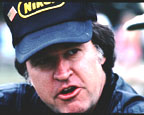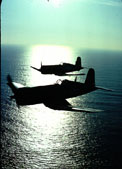 Grassroots
Grassroots

Grassroots
Budd Davisson, July, 1995
Standback, folks. I don't do this often, but, I feel the need to climb up on a soap box. I recently had an experience that hit me with something I think I ought to share with you.
A lot of us go through life with an entire cast of names floating around the periphery of our minds. Each of those names calls forth an image of what we personally define as a hero. For some, those may be sports figures or scientists, actors or pilots. But in all cases they are someone whose deeds touched us in a way that had long lasting effects. Maybe they effected us so strongly we tried, in some fashion, to emmulate them. Every kid, for instance, who ever walked on a ball diamond has a little bit of Diamaggio or Mantle permeating their soul.
Everytime I slide down into the Pitts cockpit, somewhere far off in the theater of my mind, an endless checklist of names flickers past. These are the names of men who's deeds were instrumental in getting me into a cockpit in the first place. Today, some of those names no longer have the immediate effect on the general population they once had. But they still effect me. Names like Grabeski, Johnson, Boyington, Hill, Rossi, Olders and many more etched themselves into my subconscious from the very day I was capable of reading of their exploits.
I can't exactly explain why the old fighter pilots had such an effect on me, but It goes far past my own desires or frustrations at not being a fighter jock. When I think of Tex Hill saddling up his P-40 in Kunming or picture Jim Howard's Mustang dropping out of the sky into a mess of Fortress-hungry Messerschmitts they fall into exactly the same historical framework in which I put Wyatt Earp, Texas Rangers and all those nameless individuals who throughout history have stuck their necks out to protect what they believed in and held dear.
The foregoing is why, when I found myself in a room full of grey-haired warriors which included the likes of Joe Foss, Tex Hill, Bruce Carr and so many others I felt as if I was fourteen years old and living out my fondest fantasy. This was the American Fighter Aces Association reunion in Mesa, Arizona and the faces behind the name tags were older versions of those in all the books I had read growing up.
These were the men who had actually written the history, who had actually gone toe to toe with entire hostile nations to protect their own. They were, and are, a rare breed.
Every civilization of any size has recognized and revered its warriors. We are no different. But, as I walked around amongst these men, continually eaves dropping so I could share in a bit of remembering, I was a little sad.
I was sad because I suddenly came face to face with the mortality of the hero. And therefore, with my own mortality. None of us, regardless of how much we contribute or accomplish during our time on this rotating rock, lives forever. But our deeds do. In the case of the warriors we've designated as aces, their fights and sacrifices made in the name of freedom will always be part of our heritage.
Unless, of course, revisionist versions of history change all of that.
One of the absolute facts about the revisionists who would have us re-interpret history in light of what we think we know today is that few, if any, of them were involved in making that history themselves. They are, in effect, Monday morning quarterbacking. Worse than that, they are attempting to change our view of history to relieve political and cultural pressures which now exist but were never even dreamed of 50 years ago.
I'm not given to political comments or even political thoughts, but it seems to me the entire concept of applying "political correctness" to history is damned dangerous, not to mention insulting to those who actually made that history. Once you take historical actions out of context and begin analysing them based on current interpretations, you lose the motivation that lay behind those actions in the first place. And that will effect your own decisions in the future.
We didn't, for instance, drop the atom bomb to kill people. We dropped the bomb to end a war. In that context, as awful as it was, it was successful, so, viewed in context, it was the right decision. Right at that instant in time we needed a way to stop the fighting. Those who criticise the decision say it was overkill (among other things), but we didn't know that at the time. The bomb was a weapon. A war was going on. The weapon was used. Is there such a thing as overkill in a life and death situation? (Don't send me nasty letters. I probably agree with your stance too.)
If there's one thing I learned from my dad back in Nebraska it is that you absolutely let the other man live his life the way he wants so long as he stays out of your backyard. It's not your perogative to tell him what to do. But as soon as he starts messing with your life, as soon as he's threatening your own backyard, you kick his butt and don't stop until he is out of your life, period. Avoid a fight, but once it starts, win it.
That's what we did during the war in which the fighter aces applied their deadly skills. We kicked someone's butt because they were messing with our backyard. Had they stayed out of our backyard, I wouldn't have this checklist of pilot-heros running through the back of my mind because they wouldn't have been needed. But, they were needed and they did themselves, and their nation, proud.
The same week I was surrounded by warriors at the reunion was the same week the current administration in Washington decided they would no longer use the term V-J day. They said it was too offensive. Why? We all know who was fighting on what side.
The German's have definitely owned up to their part in the war and don't try to sweep it under the rug. They have vowed it will never happen again. Why not the other guys? See, I can't even mention them or the magazine might not run this column. Worse yet, why are there factions of our own government and social organizations so willing to work so hard at rationalizing their re-interpretations of the facts? Even the U.S. has some terribly tainted historical chapters it would rather forget but we're trying, in our own feeble ways, to deal with them.
If you're wrong, you're wrong. You admit it and then move on. To continually act as if the war never happened, or the aggressors weren't the agressors, will drag the physchological war on for generations. It will never truly end.
I stood in the corner of the room and looked at the fighter aces and tried to imagine what it must have been like for them. Some had spent time in POW camps. None of them had wanted to fight a war. They didn't want to be placed in kill or be killed situations. But one thing is absolute: They know the facts because they were there. By attempting to revise the facts, what are we saying to them? And what are we doing to the memory of those who didn't make it?
Historical wounds heal only when they are treated honesty and left open to the air of reality. If we allow the deeds, courage and sacrifice of our past to be distorted through the lens of the revisionists, we are likely to fullfill the nay-sayers' predictions that the U.S. will never be a long-term entity. If we don't live up to the image we long ago defined for ourselves as doing the right thing and calling a spade a spade, we're doomed.
For most of my life, when I heard the term "American", I pictured some tight fisted, firm jawed individual, maybe a Texas Ranger, maybe a hardware dealer on Flatbush Avenue, who wouldn't back down from what is right. Now I'm not too sure about that image. Increasingly I see him with perfect, razor cut hair, wearing a barbeque apron and sporting wing tip shoes while he tries to find a conversational position that won't offend anyone.
Walking among the aces, I couldn't help but feel proud. They are as I envision the American.
Any who know me will vouch for the fact that I'm neither liberal nor conservative. Neither right-wing, nor left-wing, I fly a bi-plane. But I'll tell you one thing, it was hard to meet this proud bunch of men while knowing that many people in this country don't understand their contributions. Much worse than that, there are far too many who don't care. That is the kind of thinking which could eventually start unraveling the fragile fabric we call freedom.
When we forget what it meant to be an American in a time of crisis, we will cease to be Americans.